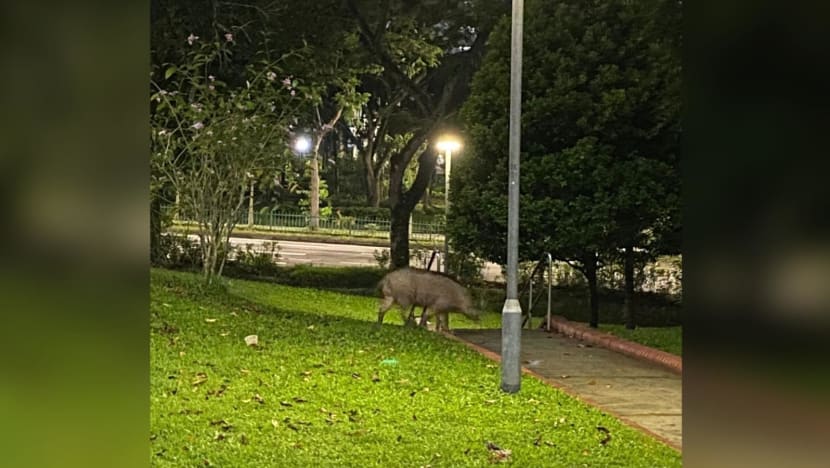19 wild boars trapped and removed from Bukit Panjang since May after recent attacks
Exclusion fences have been effective in keeping out wild boars, says Mr Tan Kiat How.

A wild boar seen at Bukit Panjang. (Photo: CNA/Javier Lim)
SINGAPORE: Nineteen wild boars have been trapped and removed from the Bukit Panjang area since May following two attacks on residents.
The National Parks Board (NParks) has been installing exclusion fences to reduce the chances of wild boars entering the estate, said Mr Tan Kiat How, Senior Minister of State for the Ministry of National Development during parliament on Monday (Jul 3).
The fences have been effective in restricting wild boars' access, Mr Tan said, adding that NParks has also deployed cattle grids, which are metal grids designed with gaps wide enough for the feet of the hoofed animals such as wild boards to enter.
“In Pulau Ubin, it has been observed that the wild boars tend to avoid stepping across such cattle grids,” Mr Tan added.
A combination of exclusion fencing and cattle grids has also been installed at three access points to restrict the wild boars' access to Zhenghua Nature Park.
Mr Tan was responding to questions from MPs Liang Eng Hwa (Bukit Panjang SMC) and Edward Chia Bing Hui (Holland-Bukit Timah GRC).
HIGH REPRODUCITVE RATES
Wild boars have high reproductive rates, giving birth a maximum of twice a year with a litter size of up to 12 piglets. Female wild boars start reproducing from 18 months of age.
“Wild boars also do not have natural predators in Singapore. NParks therefore has to actively manage the wild boar population,” said Mr Tan.
This includes carrying out habitat modification, such as removing oil palms, to reduce wild boars’ food sources.
Similar to practices in other countries, NParks also removes boars where necessary to ensure public safety, Mr Tan said.
“Based on studies by NParks, these measures have helped to keep the wild boar population in our nature reserves stable at a density that is lower than those recorded in similar forest reserves in the region,” he added.
In May, a woman was hospitalised with multiple wounds after she was attacked by a wild boar at a bus stop along Bukit Panjang Road. The animal was euthanised after it was found to have two broken hind legs.
The second attack took place on Jun 1, involving a 40-year-old man who was walking his dog at Zhenghua Nature Park. The boar bit the man's leg and left him with a wound that required more than 20 stitches.
Speaking in parliament, Mr Tan encouraged dog owners to avoid walking their dogs at night due to the low visibility and the possibility of encountering nocturnal wildlife.
Should dog owners see a wild boar in the distance, they are advised to keep their dogs close by tightening its leash and moving away from the wild boar "as quietly and as rapidly as possible", he added.
Wild boars, which are naturally found in many parts of the world including Singapore and the region, travel in herds and stay within forested areas.
While Bukit Panjang and the adjacent Zhenghua Nature Park do not have a resident wild boar population, wild boars “appear from time to time” due to the estate’s close proximity to nature reserves and other forested areas such as Chestnut Nature Park and Dairy Farm Nature Park, said Mr Tan.
He added that NParks has taken steps to mitigate risks and will be closely monitoring the wild boar situation in the area.
STEPS TO MANAGE WILD BOAR POPULATION
NParks is working closely with the grassroots and the Holland-Bukit Panjang town council to engage the public on proper food waste management to reduce human-generated food sources that may attract wild boars, said Mr Tan.
The board is also working with stakeholders to promote safe and responsible human-wildlife encounters.
This includes discouraging the feeding of wildlife, which can alter their natural foraging behaviour and cause them to rely on humans for food.
This is done through public education and enforcement action against illegal feeding of wildlife, said Mr Tan.
NParks is also engaging the community on how to respond to wildlife sightings, such as remaining calm and keeping a safe distance if they encounter a wild boar.
He said the board will respond immediately when a wild boar sighting is reported, and trap and remove any boar that is found in a residential area to ensure public safety.
“NParks will continue to take a comprehensive science- and community-based approach to manage Singapore’s wild boar population and to ensure public safety,” said Mr Tan.












.jpg?itok=R5pc4Fwr)




